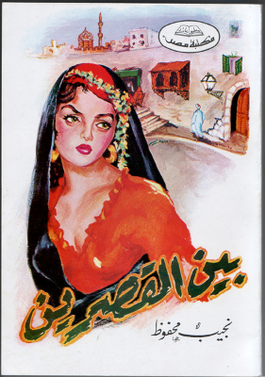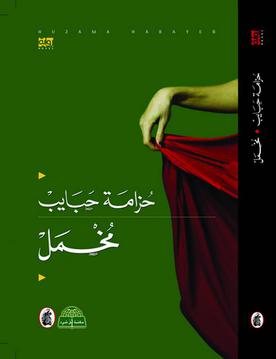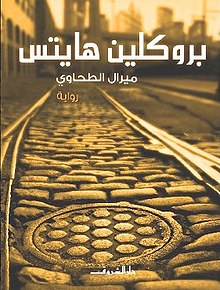
Naguib Mahfouz Abdelaziz Ibrahim Ahmed Al-Basha was an Egyptian writer who won the 1988 Nobel Prize in Literature. Mahfouz is regarded as one of the first contemporary writers in Arabic literature, along with Taha Hussein, to explore themes of existentialism. He is the only Egyptian to win the Nobel Prize in Literature. He published 35 novels, over 350 short stories, 26 screenplays, hundreds of op-ed columns for Egyptian newspapers, and seven plays over a 70-year career, from the 1930s until 2004. All of his novels take place in Egypt, and always mentions the lane, which equals the world. His most famous works include The Cairo Trilogy and Children of Gebelawi. Many of Mahfouz's works have been made into Egyptian and foreign films; no Arab writer exceeds Mahfouz in number of works that have been adapted for cinema and television. While Mahfouz's literature is classified as realist literature, existential themes appear in it.
The Cairo Trilogy is a trilogy of novels written by the Egyptian novelist and Nobel Prize winner Naguib Mahfouz, and one of the prime works of his literary career.
Bensalem Himmich is a Moroccan novelist, poet and philosopher with a PhD in Philosophy from the University of Paris, who teaches at the Mohammed V University, Rabat. He served as Minister of Culture from 29 July 2009 to 3 January 2012.

Palace Walk is a novel by Nobel Prize winning Egyptian writer Naguib Mahfouz, and the first installment of Mahfouz's Cairo Trilogy. Originally published in 1956 with the title Bayn al-qasrayn, the book was then translated into English by William M. Hutchins and Olive Kenny, and then published by Doubleday (publisher) in 1990. The book's Arabic title translates into 'between two palaces'. The setting of the novel is Cairo around the time period of World War I. It begins in 1917, during World War I, and ends in 1919, the year of the Egyptian Revolution of 1919. The novel is written in a social realist style and reflects the social and political setting of Egypt in during 1917 to 1919.

Midaq Alley is a 1947 novel by Egyptian author Naguib Mahfouz, first published in English in 1966. The story is about Midaq Alley in Khan el-Khalili, a teeming back street in Cairo which is presented as a microcosm of the world.

Egyptian literature traces its beginnings to ancient Egypt and is some of the earliest known literature. Ancient Egyptians were the first to develop written literature, as inscriptions or in collections of papyrus, precursors to the modern book.

The American University in Cairo Press is the leading English-language publisher in the Middle East.
The Naguib Mahfouz Medal for Literature is a literary award for Arabic literature. It is given to the best contemporary novel written in Arabic, but not available in English translation. The winning book is then translated into English, and published by American University in Cairo Press. It was first awarded in 1996 and is presented annually on December 11, the birthday of Nobel laureate Naguib Mahfouz, by the President of the American University in Cairo.

Latifa al-Zayyat was an Egyptian activist and writer, most famous for her novel The Open Door, which won the inaugural Naguib Mahfouz Medal for Literature.
Frances E. Liardet is a writer and translator of Arabic literature. She studied creative writing at the University of East Anglia. She has translated several book-length works, including two books by the modernist Egyptian writer Edwar al-Kharrat and one by Nobel Prize winner Naguib Mahfouz.
Miral al-Tahawy, also known as Miral Mahgoub, is an Egyptian novelist and short story writer. She comes from a conservative Bedouin background and is regarded as a pioneering literary figure. The Washington Post has described her as "the first novelist to present Egyptian Bedouin life beyond stereotypes and to illustrate the crises of Bedouin women and their urge to break free."
Samah Selim is an Egyptian scholar and translator of Arabic literature. She studied English literature at Barnard College, and obtained her PhD from Columbia University in 1997. At present she is an associate professor at the Department of African, Middle Eastern, and South Asian Languages and Literatures at Rutgers, the State University of New Jersey. She has also taught at Columbia, Princeton and Aix-en-Provence universities.
Edwar al-Kharrat was an Egyptian novelist, writer and critic.
Anthony Calderbank is an English translator of contemporary Arabic literature. He was educated at Manchester University, where he studied Arabic and Persian. He lived in Egypt for several years in the mid-1980s, making his home in the Cairo neighbourhood of Shubra. From 1987 to 1990, he lived in England teaching Arabic at Salford University, before he finally moved back again to Egypt, taking up a teaching post at the American University in Cairo. From 2000, Calderbank worked for the British Council in Saudi Arabia, living in Khobar and Riyadh. Most recently, Calderbank became Country Director of the British Council in the new state of South Sudan.
Hammour Ziada is a Sudanese writer and journalist, born in Omdurman. He has worked as a civil society and human rights researcher, and currently works as journalist in Cairo. Before, he had been writing for a number of left-wing newspapers in Sudan. Two of his novels were selected for Arabic literary awards and appeared in English translations.

Velvet is an Arabic language novel by Palestinian author Huzama Habayeb published in 2016. The book won the Naguib Mahfouz Medal for Literature in 2017. The novel depicts several Palestinian women experiencing tragic love stories under the compelling circumstances and within the ultraconservative community of Baqa'a refugee camp in Jordan.
Fawzia Abd Al-Minem Al-Ashmawi is an Egyptian academic, writer and translator. She works as a Professor of Arabic Literature and Islamic Civilisation in the University of Geneva. She had won the Golden Award in Sciences and Arts from Egypt.
Fatma Moussa Mahmoud, is an Egyptian academic, translator, and literary critic.

The 1988 Nobel Prize in Literature was awarded to the Egyptian writer Naguib Mahfouz (1911–2006) "who, through works rich in nuance – now clear-sightedly realistic, now evocatively ambiguous – has formed an Arabian narrative art that applies to all mankind." He is the first and only Arabic–Egyptian recipient of the prize.
Doris Kilias was a German Arabist and literary translator, best known for being the German translator of Nobel Prize winner Naguib Mahfouz.







